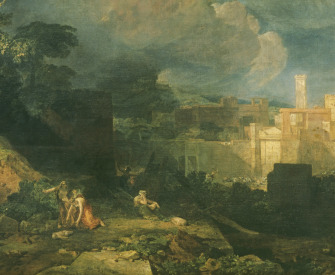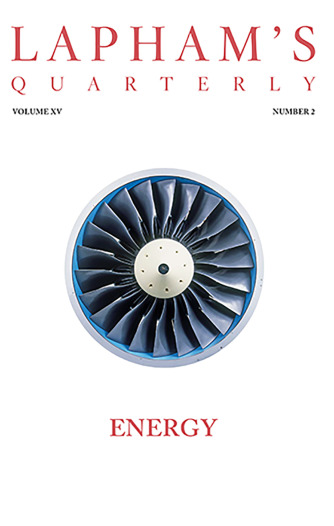Corporations have neither bodies to be punished nor souls to be damned.
—Chinese proverb,Material Interests
Joseph Conrad on exploiting natural resources.
Charles Gould had been obliged to keep the idea of wealth well to the fore; but he brought it forward as a means, not as an end.
Unless the mine was good business, it could not be touched. He had to insist on that aspect of the enterprise. It was his lever to move men who had capital. And Charles Gould believed in the mine. He knew everything that could be known of it. His faith in the mine was contagious, though it was not served by a great eloquence; but businessmen are frequently as sanguine and imaginative as lovers. They are affected by a personality much oftener than people would suppose; and Charles Gould, in his unshaken assurance, was absolutely convincing. Besides, it was a matter of common knowledge to the men to whom he addressed himself that mining in Costaguana was a game that could be made considerably more than worth the candle. The men of affairs knew that very well. The real difficulty in touching it was elsewhere. Against that there was an implication of calm and implacable resolution in Charles Gould’s very voice. Men of affairs venture sometimes on acts that the common judgment of the world would pronounce absurd; they make their decisions on apparently impulsive and human grounds.
“Very well,” had said the considerable personage to whom Charles Gould on his way out through San Francisco had lucidly exposed his point of view. “Let us suppose that the mining affairs of Sulaco are taken in hand. There would then be in it: first, the house of Holroyd, which is all right; then, Mr. Charles Gould, a citizen of Costaguana, who is also all right; and lastly, the government of the republic. So far this resembles the first start of the Atacama nitrate fields, where there was a financing house, a gentleman of the name of Edwards, and—a government, or rather, two governments—two South American governments. And you know what came of it. War came of it; devastating and prolonged war came of it, Mr. Gould. However, here we possess the advantage of having only one South American government hanging around for plunder out of the deal. It is an advantage; but then there are degrees of badness, and that government is the Costaguana government.”
Thus spoke Holroyd, the millionaire endower of churches on a scale befitting the greatness of his native land—the same to whom the doctors used the language of horrid and veiled menaces. He was a big-limbed, deliberate man, whose quiet burliness lent to an ample silk-faced frock coat a superfine dignity. His hair was iron gray, his eyebrows were still black, and his massive profile was the profile of a Caesar’s head on an old Roman coin. But his parentage was German and Scotch and English, with remote strains of Danish and French blood, giving him the temperament of a Puritan and an insatiable imagination of conquest. He was completely unbending to his visitor, because of the warm introduction the visitor had brought from Europe, and because of an irrational liking for earnestness and determination wherever met, to whatever end directed.
“The Costaguana government shall play its hand for all it’s worth—and don’t you forget it, Mr. Gould. Now, what is Costaguana? It is the bottomless pit of 10 percent loans and other fool investments. European capital has been flung into it with both hands for years. Not ours, though. We in this country know just about enough to keep indoors when it rains. We can sit and watch. Of course, someday we shall step in. We are bound to. But there’s no hurry. Time itself has got to wait on the greatest country in the whole of God’s universe. We shall be giving the word for everything: industry, trade, law, journalism, art, politics, and religion, from Cape Horn clear over to Smith’s Sound, and beyond, too, if anything worth taking hold of turns up at the North Pole. And then we shall have the leisure to take in hand the outlying islands and continents of the earth. We shall run the world’s business, whether the world likes it or not. The world can’t help it—and neither can we, I guess.”
By this he meant to express his faith in destiny in words suitable to his intelligence, which was unskilled in the presentation of general ideas. His intelligence was nourished on facts; and Charles Gould, whose imagination had been permanently affected by the one great fact of a silver mine, had no objection to this theory of the world’s future. If it had seemed distasteful for a moment, it was because the sudden statement of such vast eventualities dwarfed almost to nothingness the actual matter in hand. He and his plans and all the mineral wealth of the Occidental Province appeared suddenly robbed of every vestige of magnitude. The sensation was disagreeable; but Charles Gould was not dull.
It interested Holroyd to attend personally to the San Tomé mine; it interested him so much that he allowed this hobby to give a direction to the first complete holiday he had taken for quite a startling number of years. He was not running a great enterprise there; no mere railway board or industrial corporation. He was running a man! A success would have pleased him very much on refreshingly novel grounds; but on the other side of the same feeling, it was incumbent upon him to cast it off utterly at the first sign of failure. A man may be thrown off. The papers had unfortunately trumpeted all over the land his journey to Costaguana. If he was pleased at the way Charles Gould was going on, he infused an added grimness into his assurances of support. Even at the very last interview, half an hour or so before he rolled out of the patio, hat in hand, behind Mrs. Gould’s white mules, he had said in Charles’ room, “You go ahead in your own way, and I shall know how to help you as long as you hold your own. But you may rest assured that in a given case, we shall know how to drop you in time.”
To this Charles Gould’s only answer had been: “You may begin sending out the machinery as soon as you like.”

The Adoration of the Magi, detail of a triptych from the workshop of Gérard David, c. 1520. The Metropolitan Museum of Art, The Jack and Belle Linsky Collection, 1982.
And the great man had liked this imperturbable assurance. The secret of it was that to Charles Gould’s mind these uncompromising terms were agreeable. Like this the mine preserved its identity, with which he had endowed it as a boy; and it remained dependent on himself alone. It was a serious affair, and he, too, took it grimly.
“Of course,” he said to his wife, alluding to this last conversation with the departed guest, while they walked slowly up and down the corridor, followed by the irritated eye of the parrot—“of course, a man of that sort can take up a thing or drop it when he likes. He will suffer from no sense of defeat. He may have to give in, or he may have to die tomorrow, but the great silver and iron interests shall survive and someday shall get hold of Costaguana along with the rest of the world.”
“And do you believe that, Charley?” Mrs. Gould asked. “This seems to me most awful materialism, and—”
“My dear, it’s nothing to me,” interrupted her husband in a reasonable tone. “I make use of what I see. What’s it to me whether his talk is the voice of destiny or simply a bit of claptrap eloquence? There’s a good deal of eloquence of one sort or another produced in both Americas. The air of the New World seems favorable to the art of declamation.”
The working competence of men—which she never questioned—was very surprising to Mrs. Gould, because upon so many obvious issues they showed themselves strangely muddleheaded.
“What is wanted here is law, good faith, order, security,” Charles said. “Anyone can declaim about these things, but I pin my faith to material interests. Only let the material interests once get a firm footing, and they are bound to impose the conditions on which alone they can continue to exist. That’s how your moneymaking is justified here in the face of lawlessness and disorder. It is justified because the security which it demands must be shared with an oppressed people. A better justice will come afterward. That’s your ray of hope.” His arm pressed her slight form closer to his side for a moment. “And who knows whether in that sense even the San Tomé mine may not become that little rift in the darkness which poor father despaired of ever seeing?”
She glanced up at him with admiration. He was competent; he had given a vast shape to the vagueness of her unselfish ambitions.
Money speaks sense in a language all nations understand.
—Aphra Behn, 1677“Charley,” she said, “you are splendidly disobedient.”
He left her suddenly in the corrédor to go and get his hat, a soft gray sombrero, an article of national costume which combined unexpectedly well with his English getup. He came back, a riding whip under his arm, buttoning up a dogskin glove; his face reflected the resolute nature of his thoughts. His wife had waited for him at the head of the stairs, and before he gave her the parting kiss, he finished the conversation.
“What should be perfectly clear to us,” he said, “is the fact that there is no going back. Where could we begin life afresh? We are in now for all that there is in us.”
He bent over her upturned face very tenderly and a little remorsefully. Charles Gould was competent because he had no illusions. The Gould Concession had to fight for life with such weapons as could be found at once in the mire of a corruption that was so universal as almost to lose its significance. He was prepared to stoop for his weapons. For a moment he felt as if the silver mine, which had killed his father, had decoyed him further than he meant to go; and with the roundabout logic of emotions, he felt that the worthiness of his life was bound up with success. There was no going back.

Joseph Conrad
From Nostromo. The son of a Polish nobleman, Conrad made his earliest sea voyages aboard steamers bound for the West Indies. He docked in England for the first time in 1878. “The secret to Nostromo’s extraordinary prescience was that Conrad folded between its covers his own ‘theory of the world’s future,’ ” the historian Maya Jasanoff writes. “He anticipated the ascent of an American-led consortium of ‘material interests’ ” that would “make imperialism continue to thrive whether or not it had the word empire attached to it.”

